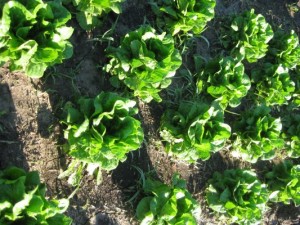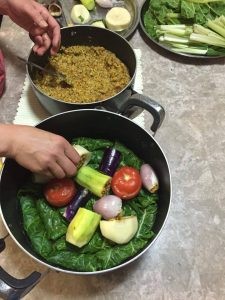Barakat Haji
 When asked to describe himself, Barakat asserts that he loves calling himself a farmer more than anything else. “I always say, my whole life I was a farmer,” Barakat relates. “It’s really fun being a farmer.” In Iraq, Barakat remembers that every home had a small garden attached to it, where families would gather in the evenings and enjoy the plants growing around them. Barakat tries to continue this practice by bringing his children with him to his garden plot at the Antelope Community Garden. He contributes to that community with his children by helping other people work in their plots and take care of their crops, just as he cultivates food to share with his family and friends.
When asked to describe himself, Barakat asserts that he loves calling himself a farmer more than anything else. “I always say, my whole life I was a farmer,” Barakat relates. “It’s really fun being a farmer.” In Iraq, Barakat remembers that every home had a small garden attached to it, where families would gather in the evenings and enjoy the plants growing around them. Barakat tries to continue this practice by bringing his children with him to his garden plot at the Antelope Community Garden. He contributes to that community with his children by helping other people work in their plots and take care of their crops, just as he cultivates food to share with his family and friends.
It’s really fun being a farmer.
Not only does the garden plot provide Barakat and his family with food, but he regards it as a way to gather his family away from the influence of modern technology: “We get to walk from here to there, and coming back; it’s a type of exercise. You work over there. You feel like it’s a small bubble taking from you all those devices, electronics, so I feel really it’s good to have it.” In Lincoln, Barakat has become part of a small community of Yazidi refugees, many of whom work alongside him in the Antelope Community Garden. He hopes that they can work together to bring about positive change, both here and back home, “starting a community with gardens.”
We get to walk from here to there, coming back it’s a type of exercise. You work over there. You feel like it’s a small bubble taking from you all those devices electronic so I feel really it’s good to have it.

Within the Yazidi community, Barakat says that they often talk about whether they are happy here in Lincoln. Although the transition has been difficult in a lot of ways, Barakat remains active with the Yazidi people, both in Lincoln and through his travels to Washington DC and New York City to advocate on behalf of Yazidis worldwide. He came to Lincoln in April of 2012 because he found out it was a safe place with a Yazidi community that would support his family, especially his children. “Because if you want to be a part of a community,” Barakat says, “you should help them, work with them, know them, know you, and that’s how you get to be part of a community.” Barakat feels hopeful that his children will have better lives here in the United States, especially if people continue to advocate on behalf of the Yazidi refugees.
I feel like everybody in Lincoln they are like almost one family. We get the respect, if you see them on the street they will say hi to you, they will smile for you, which is really nice.
“[The United States] was our second country, but I think pretty soon it’s going to be our first country,” Barakat relates. “I feel like everybody in Lincoln, they are like almost one family. We get the respect. If you see them on the street they will say hi to you, they will smile for you, which is really nice. In our country it was hard for us, especially as a minority, to live over there and wherever you go you get that feeling that you’re not from here. Even if you’re born there and you’ve been forever over there, you don’t feel you’re there. Like, I’ve been here for four years, I feel I’m here, like I was born over here. It’s good.”
